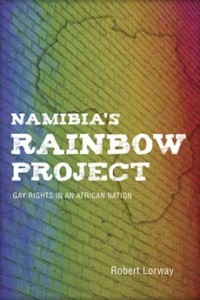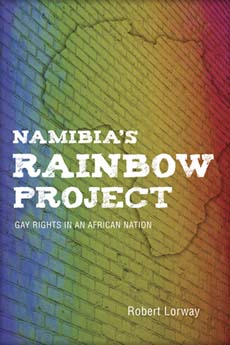 Namibia’s Rainbow Project:
Namibia’s Rainbow Project:
Gay Rights in an African Nation
by Robert Lorway
Indiana University Press. 182 pages, $24.
THE BASIC STORY of Namibia’s Rainbow Project is the impact of efforts by Western activists in Namibia after President Nujoma’s attacks on “gays, lesbian and common criminals,” which unleashed a wave of political homophobia from the mid-1990s on.
The effort to reconcile their cultural environment with models imported from the West came with a cost to many of them, some of whom Robert Lorway came to know and work with during his time in the country almost a decade ago. What happens, he asks, when impoverished young women and men were drawn into a project of transnational GLBT mobilization? While Lowry does not place these initials in quotation marks, it’s clear from the outset that this alphabet soup already makes assumptions that are not necessarily transferable to another culture.
From his observations of the work of the Rainbow Project (TRP) and his meetings with people across Namibia, Lorway came to a position of deep skepticism about the ability to adopt the “global gay” identities in isolation, concluding that “TRP’s programs not only inhibited important political possibilities but sometimes also reinforced social inequalities.” How this played itself out is the substance of the book. Particularly striking is Lowry’s deconstruction of the attraction that older white men seemed to have for young Namibian “gays.”
Namibia’s Rainbow Project at times bears the fingerprints of its origins as a doctoral thesis, and some readers will find the theoretical language off-putting. Lorway’s conclusion that what began as an attempt at gay liberation was destroyed by what he terms “post-structural violence” will discomfort many. But the issues he raises are crucial if we in the West are serious about reaching out to the majority of the world’s GLBT population, who have neither the political nor the economic space to live out the lives that they increasingly glimpse through global media.
When Lorway concludes that “universal gay rights discourses tend to place Western gay people and narratives at the center of sexual liberational achievement,” I felt a distinct sense of self-recognition. However much we deny this, it is almost certainly true that those of us who want to be global in our politics will necessarily speak from our own position of privilege. It becomes too easy to assume that the coming-out narratives of West Hollywood and the Marais are universally applicable and that the demands of queer movements in affluent liberal democracies are somehow universal. Reading Namibia’s Rainbow Project reminds us that while we may well aspire for some rights to be universal, they will always be shaped by local cultural, economic, and political possibilities.
Lorway is cautious in his claims and does not link his observations to other parts of the world where similar stories are being played out. But what emerges is a cautionary tale with far wider applicability than to Namibia. It should be compulsory reading for all those GLBT groups that have embraced global issues and forgotten the dangers of wading in without very carefully thinking through the long-term implications of immediate action.
________________________________________________________
Dennis Altman, whose latest book is Homosexual: Oppression & Liberation, is a professor of politics at LaTrobe university in Australia.






